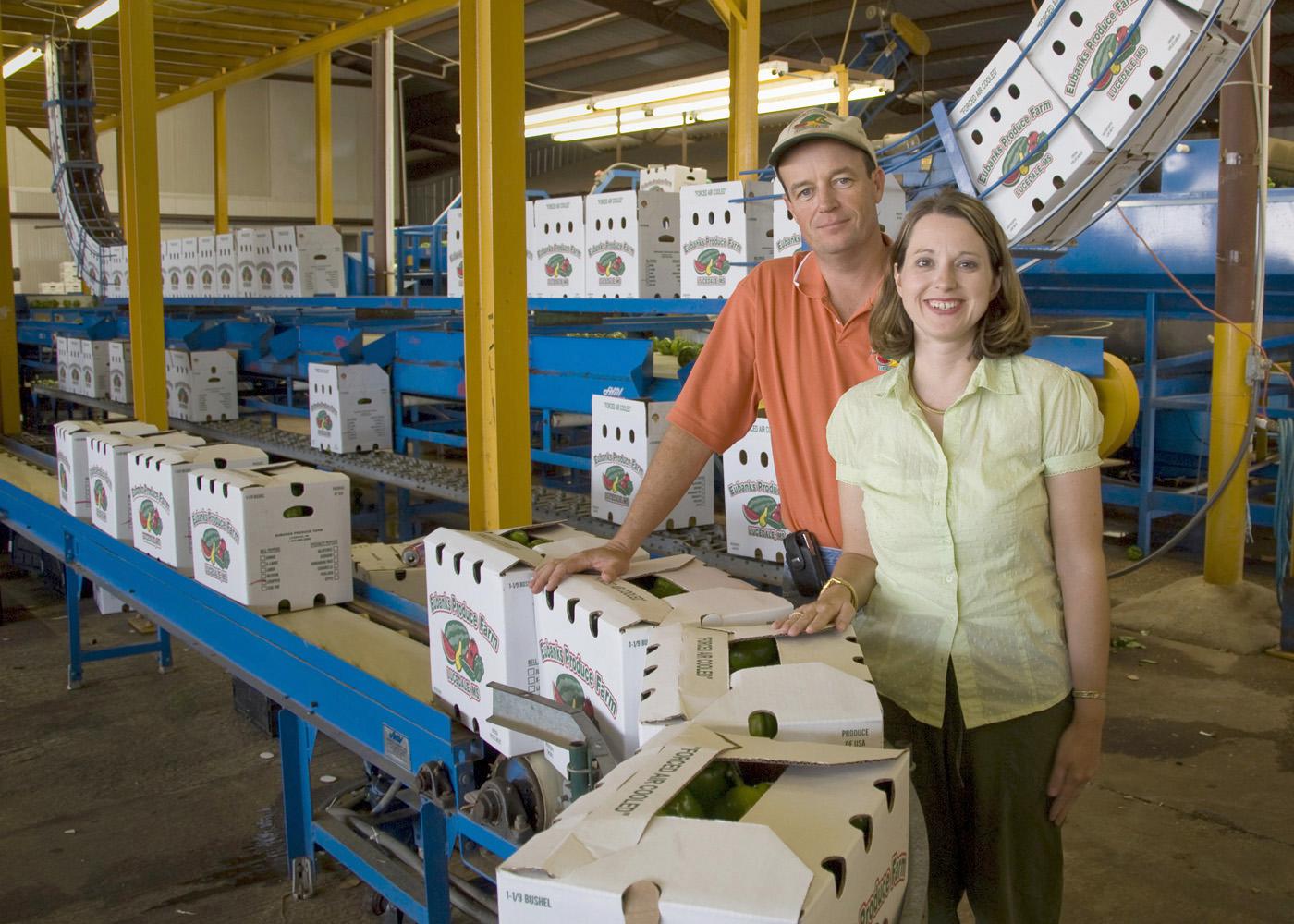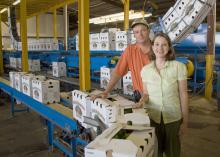Information Possibly Outdated
The information presented on this page was originally released on August 21, 2008. It may not be outdated, but please search our site for more current information. If you plan to quote or reference this information in a publication, please check with the Extension specialist or author before proceeding.
Rural acres give first-class produce
MISSISSIPPI STATE -- The Homestead Act gave the Eubanks family 165 acres in 1896, and that acreage -- which has grown to 1,000 today and is still in the family -- is being farmed in ways that were not even dreamed of 100 years ago.
Allen and Janice Eubanks own Eubanks Produce Inc. in Lucedale. They operate a large-scale produce farm in rural George and Greene counties, and name Wal-Mart as one of their biggest customers.
The farm is active almost year-round, growing strawberries, squash, bell peppers, cucumbers, eggplant, tomatoes, specialty peppers, cantaloupes, cabbage, watermelons and onions.
“We grow something 11 months a year,” Janice said. “We take vacations in July.”
Allen, a 1992 Mississippi State University graduate, started Eubanks produce in 1992.
“Dad grew cattle, beans, corn and some watermelon. Growing soybeans and corn was a dead end, so I started messing with produce,” Allen said. “I had about 100 acres the first year and I picked and hauled it all myself.”
Janice graduated in 1992 from the University of Southern Mississippi with a degree in computer science. They married in 1993 and have three sons and a daughter ages 10, 9, 4 and 2. Both Allen and Janice are volunteer 4-H leaders, and two of their children are in 4-H.
Janice has managed the office, financial decisions and personnel since 2003. Allen manages the farm and handles sales.
“He has his areas he covers in the business; I have mine,” Janice said.
“We wear a lot of hats,” Allen added.
Kerry Johnson is an area horticulturist for the Mississippi State University Extension Service. He met Allen and Janice when they were in 4-H and he was the agriculture agent for George County. Later, he had a class at MSU with Allen while Allen was working on his bachelor's degree and Johnson had gone back for graduate work.
“Allen has tried some of the new technology and been willing to be innovative and experiment with it,” Johnson said. “His operation is very advanced and runs as well as any major produce farm in California or elsewhere.”
Among the innovations used at Eubanks Produce are black plastic mulch and drip irrigation. Soil fumigation is used to combat insects and diseases before crops are planted.
“We embrace whatever helps us be successful,” Allen said.
Eubanks Produce has a permanent staff of seven, but it hires as many as 175 farm laborers to do the hand planting and harvesting required of most produce crops. These are migrant workers from Mexico who are legally in the country with work visas.
Eubanks Produce participates in the H2A program, which allows them to request a certain number of visas. They pay a fee per person, then pay that worker's wages and provide transportation and housing. They are monitored by the state Employment Security Commission, and the housing must pass an annual inspection on minimum square footage requirements, stoves, refrigerators and other amenities.
“We have a base of about 60 to 70 percent who return every year from Mexico to work with us again,” Janice said.
Even though the farm laborer jobs are advertised locally before migrant laborers are hired, the Eubanks have not yet had an American accept one of these positions.
While migrant workers are expected on produce farms, Eubanks Produce has one non-traditional position. In 2004, they hired a full-time food safety inspector.
“We were the first farm in Mississippi, Louisiana and Alabama to be certified in food safety,” Allen said. “We follow the Good Agriculture Practices guidelines in planting, harvesting, growing, packing and shipping.”
While a lot of companies want to see this GAP certificate before doing business with Eubanks Produce, they do not pay a premium for this food safety assurance.
“I just want quality food. There is still that chance that something could happen, so this person oversees chlorine baths for equipment, checks for open wounds on the workers' hands and does other things like that,” Allen said.
The farm sprays preventively for insects and disease and sends leaf samples to a lab weekly for analysis.
“The healthier the plants, the less likely they are to get disease,” Allen explained.
The farming operation is large. In addition to 1,000 acres in production -- of which the family owns about two-thirds -- there is a 34,000-square-foot packing house and 13,000 square feet of coolers. Nine buildings provide migrant worker housing.
The farm has had contracts with Wal-Mart since 1997 and now sells some of every product grown to the mega chain. Produce goes as far as 1,100 miles for distribution from Ft. Worth, Chicago, Detroit and southern Wisconsin.
“Everything is hand-picked,” Allen said. “Well more than half of each day's harvest is shipped out the same day it is picked. All but watermelons require cooling, which can extend the shelf life three to four days.”
Quality control is closely monitored in the picking and packaging stages.
“People have gotten used to not seeing spots in a retail store,” Janice said. “If it's not perfect, we can't sell it.”
The Eubanks' “you-pick” operation covers 80 acres and includes a large variety of popular garden vegetables. These are sold by the bucket, in most cases, at prices cheaper than the grocery store offers.
“We have 400 to 500 cars out here on opening day. Customers come from a 100- to 150-mile radius to pick fresh produce,” Allen said.
Labor is the farming operation's biggest cost, followed by shipping and fuel expenses, and then packaging, which counts for 10 percent to 20 percent of the overall cost.
While profits are important, they are not all-consuming. The farm participates in the Gleaning Network of the Society of St. Andrew, a humanitarian organization.
“After the crop is harvested, we call them to come pick what is left of the cabbages or cucumbers to give to food banks,” Janice said.
Contact: Dr. Kerry Johnson, (601) 947-1301






